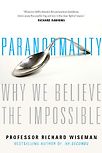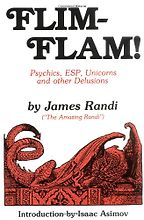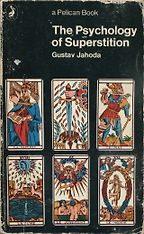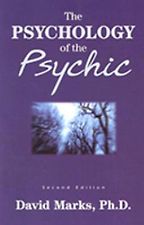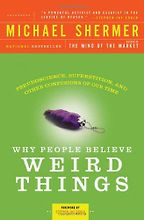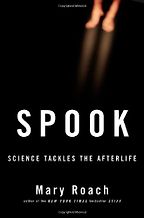How and why did you turn your scientific eye to the paranormal?
The paranormal is one of my research topics. I’ve spent 20 years looking at ghosts and alleged psychics and so on. But in a sense it’s the scepticism that underlies all of my work that attracted me – whether it’s looking at people who claim to be very lucky, or at human behaviour which on the face of it looks one way, but if we use science and psychology then we find out what’s really going on.
I think it’s enormously important to be sceptical, particularly in psychology because we’re very good at leading ourselves astray. Anyone who’s seen optical illusions will realise we’re good at thinking the world is one way, but actually there is something else going on. Being fooled like that normally isn’t a good thing – it tells you a lot about your brains and your eyes and so on, but for the most part we want to accurately understand what’s happening in the world, and that’s why psychology is so important.
So by investigating these seemingly ridiculous claims, we can find very real scientific knowledge about our brains and how we perceive the world.
Absolutely. Paranormal experiences – whether it’s a psychic or an out-of-body experience or seeing a ghost – may not tell you anything about the world of the supernatural, because that world doesn’t exist, but those experiences still tell you about how your brain and mind operate.
How important is it to debunk this stuff? Why not humour the people who believe in ghosts and UFOs?
Well it’s up to people what they believe. My feeling is that they’re bombarded with pro-paranormal information, whether it’s from psychic hotlines or broadcasters putting out ghost shows, or in magazines and newspapers. The books we’re talking about and my book Paranormality really just say to people, “Here’s the other side of the equation – at least give it a try before you decide this stuff definitely exists.” I think that’s really important, because certainly when it comes to psychics and mediums people allow them to have a massive influence over their lives. They don’t understand the tricks of the trade. It’s very important to be an informed consumer.
Is there less belief in the paranormal in the era of modern science?
It would be nice if that were the case. If anything it looks the opposite way round. As science and technology grow, so too does belief in the paranormal. At the moment in the UK around 50% of people believe in some sort of paranormal phenomenon. In the US it’s about 80 or 90%. So it’s a massive industry. And unfortunately, science isn’t getting rid of it.
Does pop culture enter the equation? The X Files or films like Paranormal Activity.
If it’s fiction then that’s absolutely fine with me. I’m a big fan of The X Files. I love sci-fi. As soon as it purports to be fact, I think there is an onus on the broadcaster or the publisher to check their facts. And because they don’t want to do that – they know these things are not true – they have people running around a haunted house with a video camera, all screaming and saying this stuff is genuine. They know that’s “bums on seats”.
So you’re not going to get both sides of the story from that. You’re only going to get one side and it’s really tricky to find the opposite side. These books do not sell in massive numbers. It’s actually quite niche literature. When Paranormality came out, there was a lot of criticism from psychics and mediums that did not want the tricks of the trade out there.There is a kind of pressure not to reveal these tricks. There’s a bit of an overlap with magic, where magicians want to keep their secrets to themselves. But I think it’s completely unethical, because magicians are honest deceivers – they tell you that something is fake and fake it for entertainment – but with psychics and mediums they don’t tell you that at all. It’s a huge abuse of the kind of counselling contract.
Let’s move onto the first of your book selections, Flim Flam! I understand James Randi was originally a stage magician.
Yes, James started his working life as a magician. Then he became an escapologist, following in Houdini’s footsteps. And like Houdini, he was very sceptical about the paranormal. Since the 1970s he’s done a lot of very high-profile debunking.
And what does he debunk in this book?
Flim-Flam! had a huge impact on me when I first came across it, because it was the first time I’d seen a whole volume which wasn’t taking any nonsense, which wasn’t saying “maybe this stuff is true”. It’s a hardline approach that looks at a whole range of issues. Things like the Cottingley fairies, the Conan Doyle case, spoon benders, psychic surgeons – he says that’s all essentially tricky. What impressed me was that he got out into the field, he did the research, and it wasn’t a “maybe some of this stuff is true” approach. He was simply saying, “None of it is true and here’s what’s really going on.”
Tell us about his $1 million prize.
He has a long-standing financial reward if anyone can prove under test conditions that they’re psychic. There are various people who act as testers for him in various countries – I’m one of them in the UK. I’ve tested a few people. And it probably says something about the psychic world that in the 10 years that the prize has been up for grabs, no-one has come even close to claiming it.
Who are some of the people you’ve tested?
I tested a woman called Patricia Putt who was convinced she could give psychic readings for people, and that they would recognise their past and present in those readings. So we had lots of people come in, she would write down her readings, then we showed them to people and said you had to choose yours out of all of them. And suddenly they were at a loss. That’s because when you go for a psychic reading you know it’s meant for you. You’re sitting there, there are all these ambiguous comments, you can read into them and suddenly be impressed. Once you take away that mechanism everything collapses.
I was curious to read about Randi’s run-in with Uri Geller. Tell us about that.
James had a long-standing feud with Uri Geller which occasionally ended up in the courts. The bottom line is James is saying spoon-bending is sleight of hand and Uri is disputing that, but again if Uri were up for proper testing then we could settle the issue once and for all. A million dollars – quite a large sum of money – is sitting there waiting for the first psychic who can prove they have these abilities.
Randi also puts religious miracles – the virgin birth, the parting of the Red Sea – in more or less the same basket. Should miracles be treated in the same way that the paranormal is?
Good question. If there’s some evidential side to it. If someone is just saying “I believe in God and can’t offer evidence for that”, it is faith and that’s fine. There’s nothing science or psychology can do with that. But as soon as they say “I’ve produced this twinket from the Gods” or “I can part the seas” or “I can cure illness” – as soon as there’s some sort of physical manifestation of that belief – then scientists and psychologists can do some business. Again the results will be the same as the other kind of psychic testing – that people don’t have these abilities.
Do you think that miracles in the Bible were intended to be understood literally?
Certainly I think they were intended to convince people that there is something weird going on. And lots of people do believe in God because of the miracles. So I want to say, “Hold on. Before you make that leap of faith, at least hear what the scientists have to say. You may not be convinced by it, but at least hear the arguments.”
Let’s move onto Gustav Jahoda’s The Psychology of Superstition.
It’s a great book. It’s fairly old now, but a readable introduction to a psychological take on the whole of the paranormal. He takes it away from talking about people’s experiences per se. Randi is looking, for the most part, at people claiming to be psychics. Rather than looking at psychics and mediums, Jahoda looks at our own everyday psychology. Why is it that we touch wood and cross our fingers? Why are we superstitious thinkers? It’s a very early but very important treatise on that topic.
Is it in some sense the anthropology of superstition?
To some extent. Certainly there’s some anthropology in there. He talks about the fact that good luck charms have materialised right across the world. The notion of amulets to bring you good fortune appear in pretty much every culture in the world. He argues that there’s something very deep-seated in us that revolves around the notion that we live in a very uncertain world. We’re worried about the future, and anything that can give us some certainty – even in the absence of hard evidence – is a very appealing psychological thought. Thus you get amulets and all sorts of superstitious behaviour.
Are some cultures or demographics more prone to believe in the superstitious or in certain superstitions?
We know that is the case from polls and surveys. As I said at the beginning, more people believe in this stuff in the US than in the UK. And when you go from the West to the East, the numbers tend to be very high. So something is going on culturally. There seems to be some kind of bedrock, something in our brains which tells us this stuff is true and we should believe it. But the exact form it takes is often molded in the culture. If you take sleep paralysis – and the idea that there is an incubus on your chest sucking the life out of you, paralysing you – in some cultures that’s seen as an old hag coming into the room, in other cultures it’s an alien, in some it’s an evil spirit. The experience is the same, but the way it’s interpreted is very different from one culture to another.
I get sleep paralysis myself. It can be terrifying, and I can easily imagine why some cultures explain it supernaturally.
It is a very scary experience. You can’t move and you may find it difficult to breathe. That alone is terrifying. But once you understand the science of it, it is less scary than thinking there are spirits on you.
Next on your list is David Marks and The Psychology of the Psychic.
David is another person who had a lot of influence over me. He was teaching at University College London when I did my psychology degree there. The Psychology of the Psychic, along with Flim-Flam! was one of the first sceptical books that I came across. David is a very good psychologist and his is a more detailed approach, focusing on parapsychological research – laboratory based research into ESP – and really dismantling some of those experiments. He said, this is what you’ll read in the journals and newspapers but this is what’s actually going on. It was the first time I’d seen someone take a look at scientific paranormal research in that way.
What exactly are the claims of ESP?
There are all sorts of claims but the notion is that, rather than there being a small number of people with amazing powers, all of us to some very small and unreliable extent have ESP – extra-sensory perception – and therefore could tell something like the order of a shuffled deck of cards. To demonstrate that, parapsychologists get lots of people in a lab, shuffle the deck, get people to guess the order and then put all their results together and see if they do better than chance. The argument is that a very small and unreliable effect emerges. And David’s book is one of the very first to cast a sceptical eye over that literature. It’s a very wonderful book.
What are some of the other experiments into ESP?
There was one conducted by the US military to see if you could have psychic spying – what’s going on at this particular coordinate, or what’s going on in Russia. David pointed out these experiments had a lot of fundamental flaws to them. It’s like a detective story. You have to go deep into the experiment to understand exactly how it works and where the problems can be. I’ve conducted this sort of research too. It’s enormously time-consuming, but quite fun.
How trenchant or aggressive are believers in the face of scientific evidence and argument?
If you look at reviews of Paranormality on Amazon, they are bimodal. Most people like the book and then a hardcore group giving it one star really loathe it, saying how much they dislike me as an individual. So yes, it is an area which attracts an enormous amount of controversy and bad blood. If you are very thin skinned it’s not the area for you. Often the debate gets nasty quite quickly.
Michael Shermer, Why People Believe Weird Things.
This is a more recent book. He takes a wider perspective on the paranormal, looking at UFOs and conspiracies. His argument is that we’re very good at finding patterns – that’s one of the reasons why science has been so successful – but sometimes that mechanism goes into overdrive. If you take something like finding a face in the environment, the brain would rather see a few faces that aren’t there than not see one that is. So you can look into the darkness of the bushes and see a face that isn’t there, and convince yourself that it’s a spirit or ghost.
Or Kate Middleton on a jellybean.
Exactly. Michael takes a more broad-brush perspective and argues that these things are hard-wired into our brain – it’s one of the consequences of having such a successful brain, if you like. His main thrust is that people believe weird things because they have evolved to find patterns. And that gives rise to a lot of paranormal experiences. So they’ll have a dream, they’ll witness some events and they’ll see parallels between the two, even if one is not causing or predicting the other.
What are some of the weird things that Shermer explores?
He mostly sticks to the topics we’ve spoken about – ESP, psychics and mediums – but he goes beyond the other books when he talks about conspiracy theories – where people link up ideas which aren’t necessarily connected to one another. We like to think, when it comes to conspiracy theories, that there are big causes. With Princess Diana’s death, a big worldwide event, it’s hard to think that the cause of it was something relatively trivial, like a car accident. People think there must have been more going on, that there must have been a whole conspiracy behind it.
Could atheists take those same principles of psychology and apply them to religious belief?
I think to some extent you can. But with religious belief it’s slightly different because there’s a need to believe. It’s rather nice to think there’s a God who is benevolent and looking after you. Also there are very large cultural forces. Up until reasonably recently it’s been the norm to believe – you’re told from a very young age that you should believe. With a conspiracy theory, there are obviously not many people who believe in them. So in that sense they are more psychologically interesting. When from a very young age people are told that something is true, it’s not quite so surprising that most end up believing it.
But how is belief in, say, creationism different to belief in ghosts, an equally tall tale?
Creationism is somewhat different because there you have evidence [for evolution]. So in that instance you have to explain away a huge amount of evidence against your position. One of the reasons it’s such a terrifying belief is that if you can do that – if you’ve got the mental gymnastics to explain away the evidence – you can probably convince yourself of absolutely anything. Then it just comes down to what you want to believe. And some of those beliefs are extremely bad for society.
So it’s similar to ghosts and the paranormal. The evidence is not on your side, so how do you explain it away? We don’t like dis-confirming evidence so we either ignore it, not read about it, or just say people are lying or there’s a conspiracy. It comes down to that fundamental ability to believe something that’s not true.
Tell me about Mary Roach’s book Spook.
I like Mary Roach as an author, she makes me laugh. What I like about Spook is that it’s a rather fun, light-hearted tour through all the weirdness that researchers have tried to examine. She talks about near-death experiences, seances, experiments where they weighed dying animals in order to weigh the soul as it left the body. All these strange experiences are the kind of quirky psychology which I love. The psychology of the field is quirky too. It is a deeply weird field populated by deeply weird people.
Does the soul weigh 21 grams?
That is where the movie title comes from. This was an American psychologist around the turn of the 20th century who put dogs onto scales, trying to weigh their souls leaving. He had some success with that, then tried the same with humans – putting very old people on the scales and waiting for them to die. But what he didn’t control for is sweating, moisture leaving the body. So 21 grams is probably much closer to the amount of moisture you lose when you die than your soul.
What exactly is a near-death experience?
A near-death experience is very similar to an out-of-body experience, which is where people think they’re floating away from their body, turned around seeing their body lying there. In a near-death experience, there is often a tunnel of light you go down towards meeting your maker. The gods you see depend very much on the culture you live in. Then the god turns you back, you return into your body and you wake up.
As we know more about how the brain creates a sense of where it is, we know more about how these experiences can be created. Now there are experiments where we can create an out-of-body experience fairly rapidly. Other researchers – and Mary Roach talks about these – write target numbers or words on pieces of cardboard and place them on top of cabinets and wardrobes in hospital wards, in the hope that somebody having a near-death or out-of-body experience will look down and see them. To date they haven’t. Which again suggests that this is an illusion rather than a genuine experience.
Where does provable science come closest to the occult?
It’s a good question. I guess my answer is that it doesn’t, because by the time something is scientifically proven it’s no longer occult. There have been instances where something has been going on in the weird world of the paranormal, but by investigating it properly we’ve found out what that is. The most obvious example is homeopathic medicine, where there is a placebo effect. You’ve taken a substance and it does make you feel better. That’s what’s behind homeopathy and a lot of other alternative medicines. We could have just thrown the baby out with the bathwater and said this is all nonsense, we’re not even going to bother investigating it. But as we’re doing science properly we found out that there is such a thing as a placebo effect, that it can be harnessed for good and so on. I guess that is where we fly closest.
I practice qigong and tai chi myself, and find that 20 minutes of these slow movements, focusing on breathing and energy, can noticeably relax my muscles and joints in a way that I wouldn’t have thought placebo could explain.
I think placebo is the wrong word there. There is a large amount of evidence showing that meditation of all different types is good for you. And that would be a kind of meditation – where you are putting aside the normal contents of consciousness, as it were, and trying to quiet the body and quiet the mind. That seems to have a very positive, beneficial effect on a lot of people. Again it’s another area where it would be easier to say there’s nothing going on scientifically, but if you do the research properly you see there is something not magical but deeply psychological and potentially beneficial.
Finally … how do you bend a spoon?
Well, there are lots of ways of doing it. The easiest is to go to the toilet with the spoon and bend it backwards and forwards until you get a fracture line across it. Then you smuggle it back onto the table and introduce the idea of spoon bending. Pick it up, and a bit of wiggling on the end of that spoon will break it clean in half. So if you don’t want to spend years developing your psychic skills, that’s a quick way of doing it.
Interview by Alec Ash
August 9, 2011. Updated: November 24, 2025
Five Books aims to keep its book recommendations and interviews up to date. If you are the interviewee and would like to update your choice of books (or even just what you say about them) please email us at [email protected]
Support Five Books
Five Books interviews are expensive to produce. If you've enjoyed this interview, please support us by donating a small amount.
Richard Wiseman
Richard Wiseman is Professor of the Public Understanding of Psychology at the University of Hertfordshire. He started his professional life as a magician, before turning to psychology academically. His research has focused on areas as diverse as luck and self-help, and has been featured widely in the British press and on TV. His most recent book is Paranormality: Why We See What Isn’t There. Professor Wiseman is also a speaker at the recently launched Hire Intelligence speakers agency
Richard Wiseman
Richard Wiseman is Professor of the Public Understanding of Psychology at the University of Hertfordshire. He started his professional life as a magician, before turning to psychology academically. His research has focused on areas as diverse as luck and self-help, and has been featured widely in the British press and on TV. His most recent book is Paranormality: Why We See What Isn’t There. Professor Wiseman is also a speaker at the recently launched Hire Intelligence speakers agency

